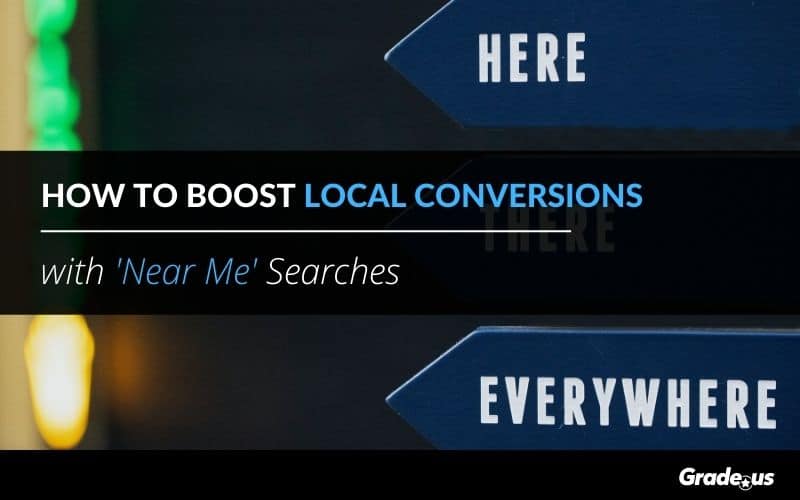Is your local business optimized for near me searches?
Near me searches have exploded in popularity. More searchers rely on these location-specific queries than ever before. If you have a local business, these queries are an essential part of local search success. Ranking for near me searches should be a key part of your Local SEO strategy.
Today, we’ll take a look at these keywords and outline why they’re important.
Table of Contents
What are near me searches?
Near me searches are location-based queries with conversion intent. These searches are goal-oriented queries that indicate a searcher is ready to take action. When someone goes to Google and literally writes the words ‘near me’ with another term in the search bar, that’s a near me search.
Why near me searches?
Lisa Gevelber, Google’s VP of Marketing for the Americas, had this to say about the rise of ‘near me searches.’
“We noticed that smartphone users were dropping location qualifiers like ZIP codes and neighborhoods from local searches. Why? Because they assume the results will be automatically relevant to their location thanks to their devices.”
These queries aren’t limited specifically to the ‘near me’ variety. These searches can be generic, specific, or branded searches. Ranking for a term with near me will likely also mean you’re showing up for terms with other local intent.
These types of queries includes location-specific keywords like ‘salons near me’ or ‘Aveda salon near me’ as well as ‘near me’ variants like ‘can I buy’ or ‘to buy.’
There’s more.
Near me searches are typically associated with location-specific terms like restaurants, gas stations, or hotels. However, there’s also been dramatic growth in near me searches for specific items.
How do we break these down?
There are a wide variety of modifiers for Near me searches. This includes variants that are:
- Location-specific (where can I buy mason jars?)
- Brand or category-specific (Buffalo Wild Wings near me)
- Product, service, or item-specific (locksmith near me)
- Signals of purchase intent (can I buy, to buy)
- Time-specific (cheap hotels near me tonight, Tow company open now)
Notice the overlap.
Gevelber identifies the desire at the heart of near me searches.
“‘Near me’ is no longer just about finding a specific place. It’s now about finding a specific thing, in a specific area, and in a specific period of time.”
This brings up an important question. How many ‘near me searches’ are there?
According to Google’s consumer insights study, there has been a:
- 900% increase in near me searches
- 500% increase in near me mobile searches that includes the variants 'can I buy' or 'to buy'
- 150+% growth in mobile searches for '___ near me now' queries
- 200+% growth in mobile searches for near me variants 'open' + 'now' + 'near me'
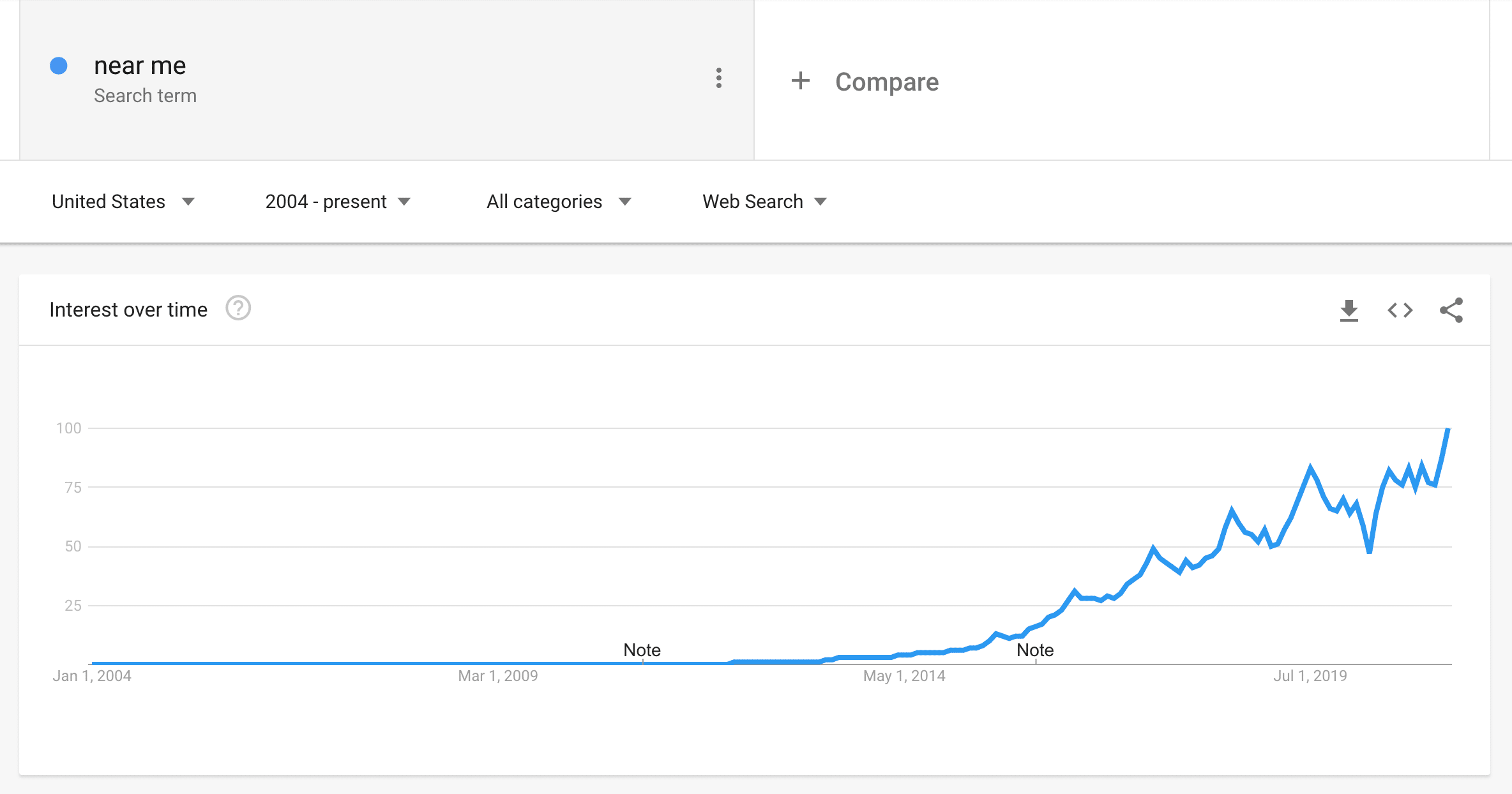
Source: Google Trends
A recent survey of 4,500 consumers by Ipsos MediaCT found:
- 88% of smartphone users and 84 percent of tablet owners conduct local searches
- These search queries were oriented around directions, addresses, product and service availability
What about the volume of local searches? Research shows that 46 percent of searches on Google have local intent.
Almost half!
Desktop vs. mobile: Which one matters more for near me searches?
They’re both essential.
While mobile has grown in prominence, Statcounter’s research shows that both are essential must-have components of your local search campaign.

Source: Statcounter
These figures break down as follows:
- Desktop: 49.5%
- Mobile: 46.68%
- Tablet: 3.82%
See what I mean?
It’s basically a 50/50 split. This means that, for now, you’ll need to prioritize both in your local search campaigns.
What if you can’t?
If you don’t have the budget or resources to optimize for both, it’s a good idea to focus your attention on mobile searches first before including desktop searches.
Why mobile?
In a post for Search Engine Land, Greg Sterling pointed out that “Google has said formally and informally at different points that ‘local intent’ search constitutes 30, 40 and even 50 percent of mobile queries. The current official number is 30 percent.”
Approximately 82% of respondents in Uberall’s ‘Near Me Shopping Report’ had used their smartphone to complete near me searches.
According to Google’s report: ‘How Consumers Solve Their Needs in the Moment,’ 76% of people who complete a search on their smartphone visit a local business within 24 hours; 28% of those people go on to make a purchase.
What does this mean?
As mobile search grows, desktop search will decline.
Does this mean that desktop search will decline to nothing? Probably not. You’ll still have a large number of desktop searchers who will continue to use Google on their PC.
Why would local businesses want to rank for near me searches?
It’s kind of obvious, right?
Remember our definition of ‘near me searches?’ They’re location-based queries that signal conversion intent. These searches are goal-oriented queries that indicate a searcher is ready to take action.
Okay, what kind of action?
- Traffic to your website: This is cold traffic that you can invite back to your site via remarketing and review management campaigns
- Phone calls to your business: These can be messages, live chat conversations, or phone calls to your sales, support, or fulfillment teams
- Footfalls/ foot traffic to your location: In-store visits to your retail storefront that gives you the chance to convert physical visits to regular and repeat customers
Here’s why this is significant.
The majority of these searchers will be cold visits; only a small minority of these visitors will be ready to buy. This means most of these visitors will need to be nurtured via follow-up campaigns. Use local content marketing (e.g., reviews, social media, citations, discounts, promotions, incentives, etc.).
If you rank for these near me searches, you’ll have what you need to drive a steady stream of traffic to your business via your website, live chat, phone calls, and footfalls.
What does a near me search look like?
As a general rule, near me searches display results based on proximity, relevance to your query, and overall prominence. There’s a great degree of overlap with these results, but there are also some differences as well.
Let’s look at a few examples.
Near me searches: Hotels
Query: Hotels tonight chicago
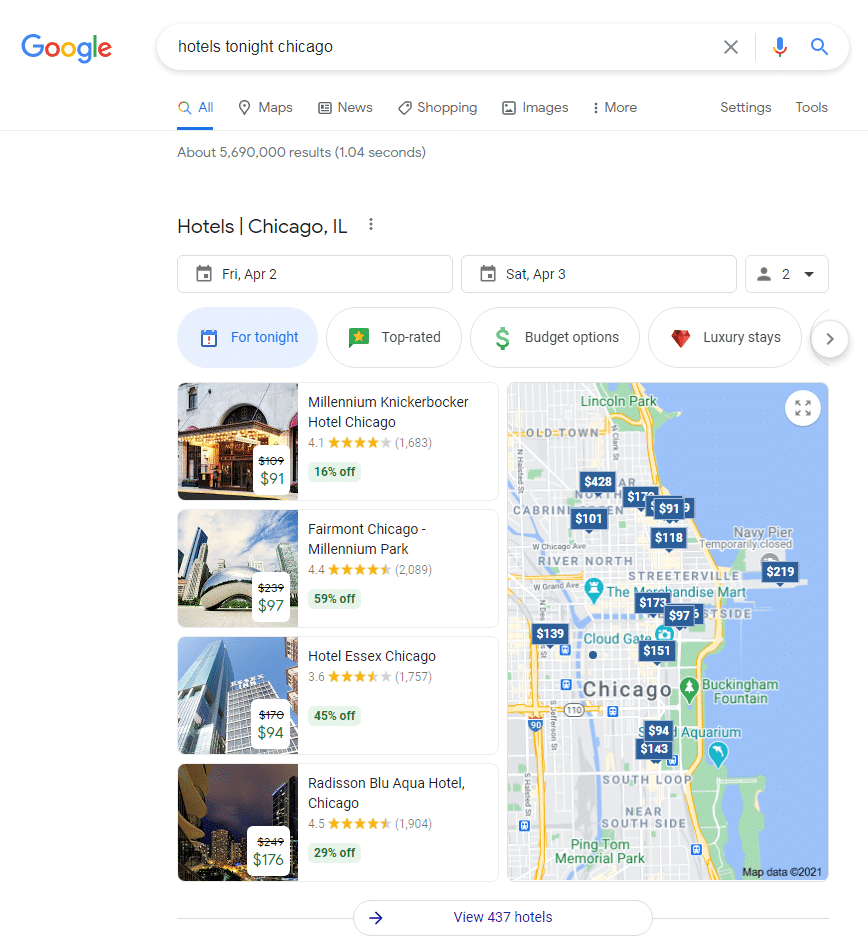
Google wants you to choose one.
These listings are part of Google Hotel Ads, a service that’s separate from Google Ads. If you look at the number of hotels listed at the bottom of the screenshot above, you’ll see there are a total of 437 hotels competing for clicks with this particular ad platform.
Searchers can sort hotels by date, price, luxury, and other criteria. They’re also able to begin the booking process by choosing dates and the number of people staying in your room.
Near me searches: Electricians
Query: Electricians near me
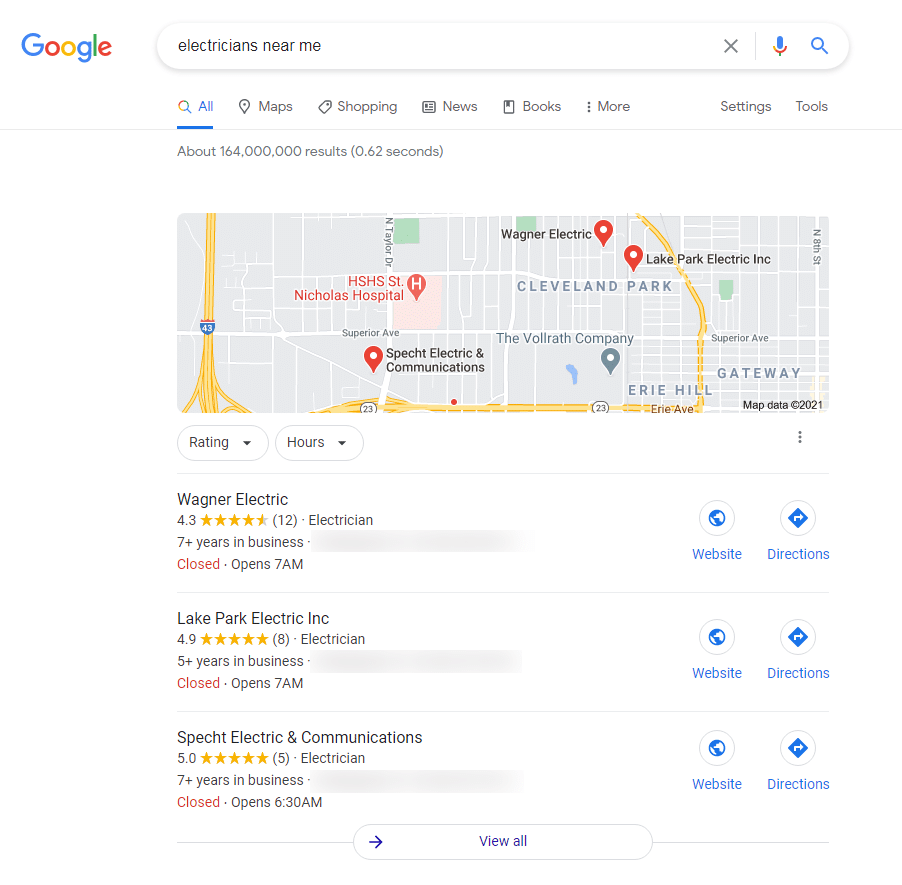
Google allows searchers to sort local pack results by rating or hours of availability. Reviews play a very prominent role here as well as citations and a strong GMB profile.
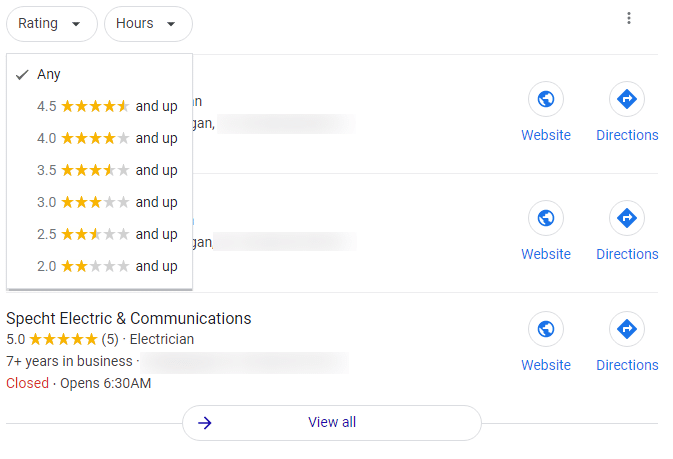
Businesses can use hours of availability as a competitive advantage if it makes financial sense for customers.
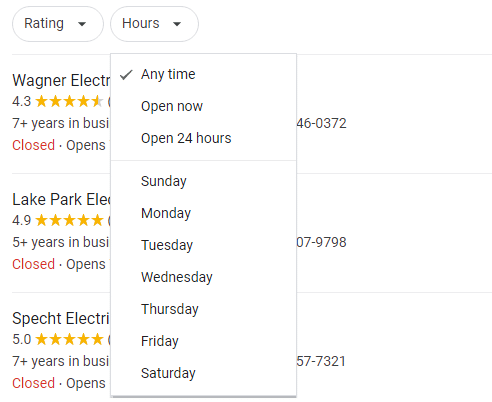
If you’re a service provider (e.g., attorney, accountants, electrician, etc.), you may also see Google Local Ads in the search results along with the local pack.
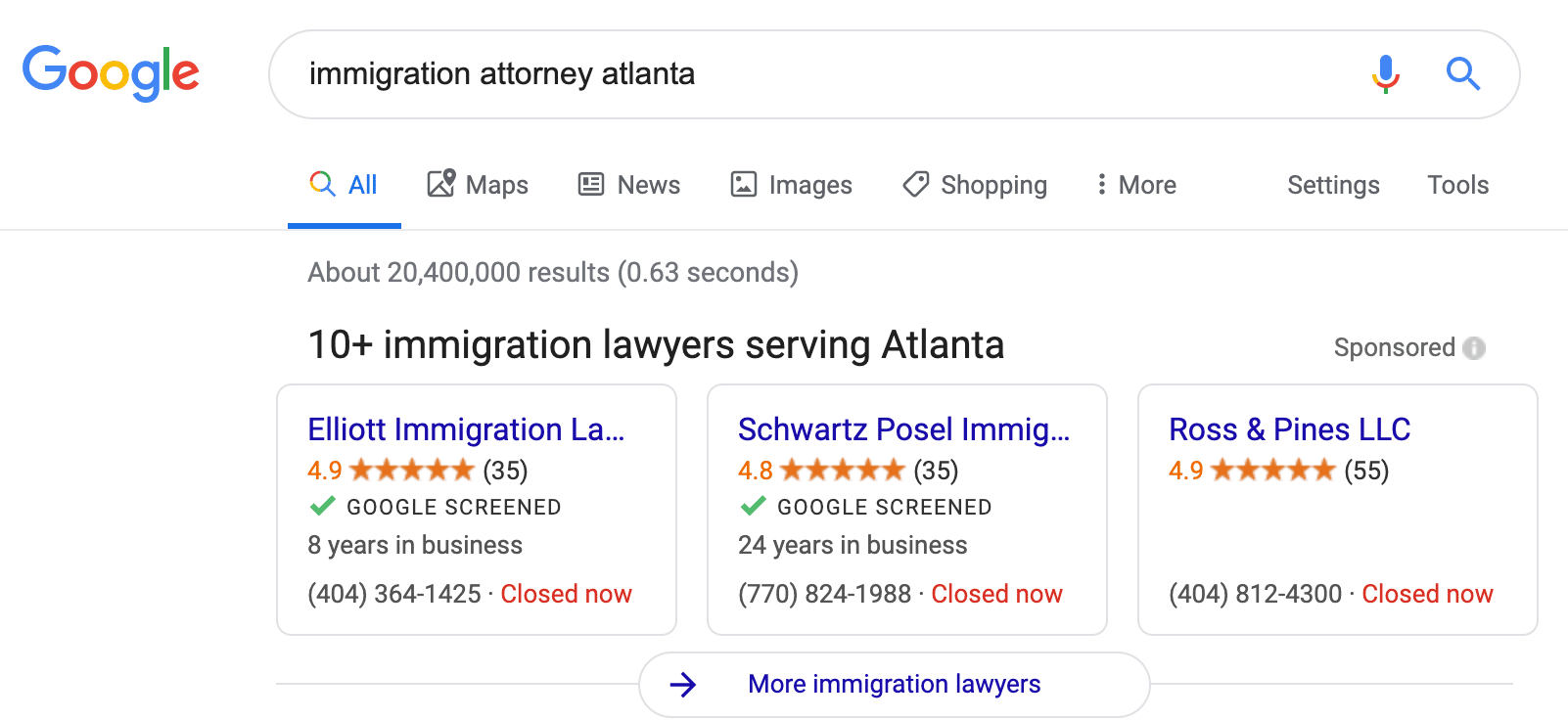
Near me searches: Restaurants
Query: Restaurants near me ohare
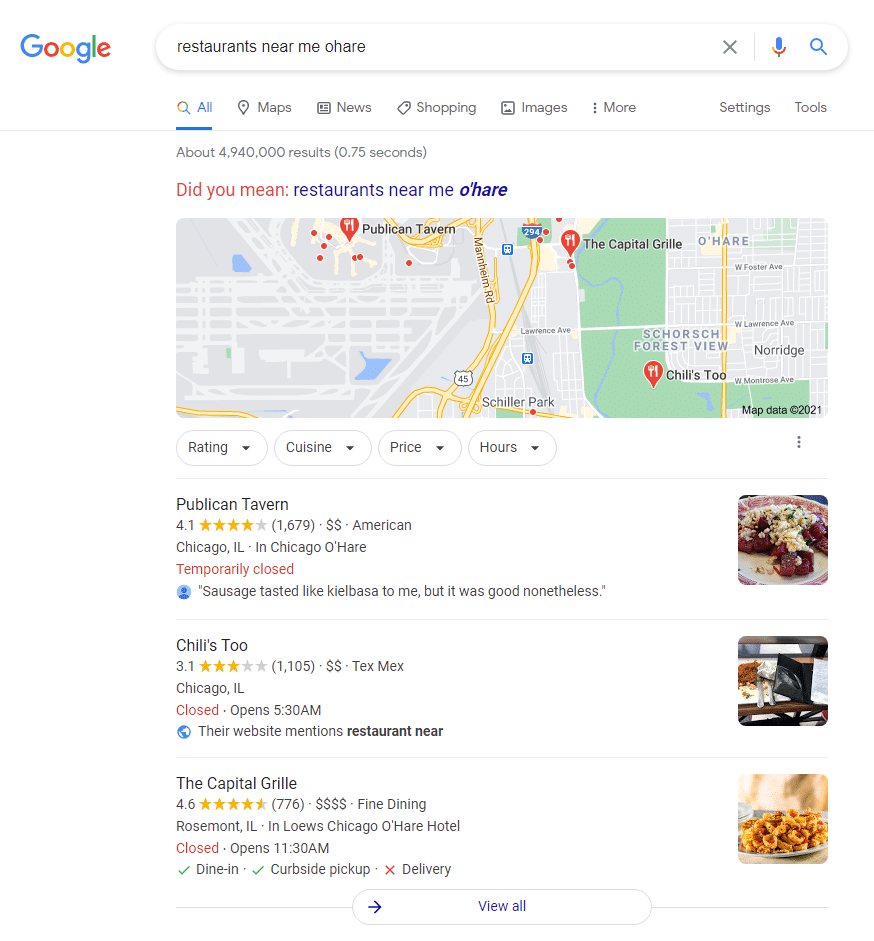
Like service providers, searchers can filter restaurants by aggregate review ratings, cuisine type (e.g., Indian, Mexican, Chinese, etc.), price, and hours.
Near me searches: Golf Courses
Query: golf courses near me open to public
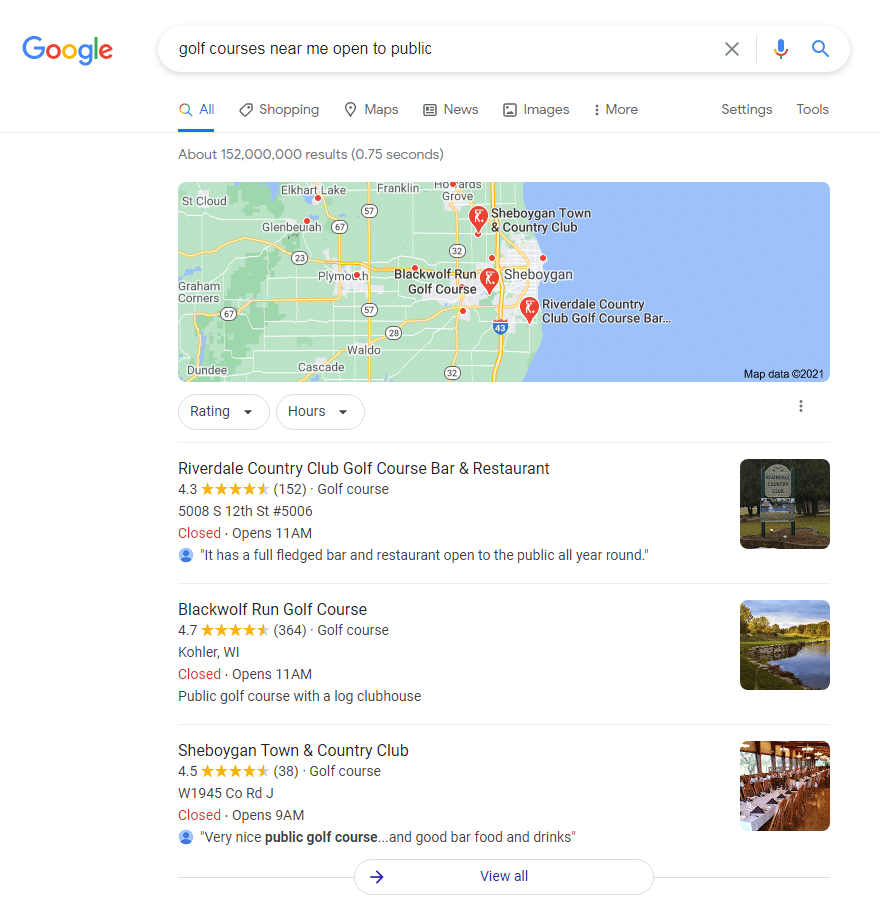
With this query, searchers can again filter local pack results by rating, hours, and availability. Like every other industry, reviews play a prominent role in all of these.
Fairly simple, right?
The rest of the search results are fairly standard and will typically include aggregate reviews, review sites like Yelp, TripAdvisor, Facebook, and relevant websites and content.
What determines rank with near me searches?
Google shares the answer directly.
“Local results are based primarily on relevance, distance, and prominence. A combination of these factors helps us find the best match for your search. For example, our algorithms might decide that a business that’s farther away from your location is more likely to have what you’re looking for than a business that’s closer, and therefore rank it higher in local results.”
Let’s break these factors down a bit.
- Relevance answers the question, is your business the best match for a searcher's query? Google needs content from you to answer that question definitively. The more content you provide via your website, reviews, Google My Business, and other third-party sources, the easier it is for Google to determine if you're a match for searchers.
- Distance is calculated by assessing how far search results are from the location used in a searcher's query. If their query doesn't signal local intent, Google uses information about the searcher and their location to make a judgment call.
- Prominence answers the question, how well known is your business? Google uses various factors to make an assessment, including reviews, backlinks, social signals, searcher intent, branding, and other criteria to determine prominence.
Why does this matter?
Remember, Google’s not against recommending a business that’s further away if that business is a better fit for a searcher’s query.
Can you control it?
Is there a way to improve your local search rankings for near me searches?
Definitely.
Content marketing is the key; if you want to boost your local search rankings, you’ll need to gain mastery over the following four areas, at a minimum.
- Your website has the greatest impact on your local organic search rankings. The quality of your website overall and the quality of your content specifically. This isn’t rocket science — just create a user-friendly site with high-quality content that serves users first. Make sure your website loads quickly, is responsive, and is designed well. Verify that your citation data and local content matches the content on your review and social media profiles.
- Google Business Profile was 25% of local search and local pack rankings in 2018; it’s now at 33% and climbing. Verifying your listing, choosing the right categories, using relevant keywords in your titles — in short, optimizing your profile — are all important factors that impact your local search rankings. The more time you spend optimizing your GMB profile, the better your local search rankings will be.
- Google Reviews are the second most important ranking factor for local search and local pack rankings. Reviews now play a more prominent role than backlinks. Good review management begins with a strong GMB review portfolio.
- Local backlinks: Inbound links still play a significant role in your local search campaigns. The link factors are the same as they’ve always been — the quality of your inbound links and the keywords used as anchor text in your inbound links. Your ability to earn high-quality links depends on the quality and promotion of your content. The better your content, the easier it is to attract quality backlinks.
What’s the secret to all of this?
It’s consistency and completeness; if you’re consistently creating complete content for your audience (and Google), you’ll have everything you need to boost near me rankings consistently over time.
Is this really all that important?
Is near me optimization a worthwhile pursuit? Isn’t local search optimization enough for businesses? Joy Hawkins, at Sterling Sky shares some surprising answers for us.
“We have found this optimization has a much more drastic positive impact on organic ranking and traffic for ‘near me’ terms than it does for local ranking and traffic from the 3-pack.”
Did you see that?
According to Joy, near me optimization produces significant traffic gains, more so than local search rankings and traffic from the Google Maps 3-pack.
Yeah, that just happened.
If you’re looking for a detailed explanation on near me optimization Joy breaks everything down for you in her post which you can read here. Joy points out another juicy tidbit with near me optimization; it’s a tactic that’s largely ignored by local businesses.
How do you track rankings for near me searches?
If you’re starting on a small scale, you can use several browser plug-ins to track rankings. It’s a good idea to shift to an established SaaS provider once you’re tracking hundreds of keywords and multiple campaigns. Here’s a shortlist of plug-ins you can use to get started.
If you’re working with a SaaS tool, you’ll want to verify that your tool of choice can integrate data from a variety of sources, including:
- Google SERPs Data
- Google Search Console
- Google Analytics
- Google Ads
- Other CPC Data
- Other 3rd Party Data Sets
This is how you get a true and complete picture of your local search performance. Tracking mobile searches vs desktop is crucial when monitoring “near me” searches.
Near me searches are the key to revenue
Near me searches are location-based queries with purchase intent. Today, searchers aren’t interested in spending a significant amount of time searching for multiple options. Near me searches are a natural evolution away from zip codes and neighborhood markers in search queries.
People expect Google to figure it out.
Google has done just that. They consistently provide searchers with search results that are automatically relevant to their location and query. They understand that near me searches communicate purchase intent.
Now you do too.
Create consistent and complete content, and you’ll find you have what you need to boost local conversions with near me searches.

